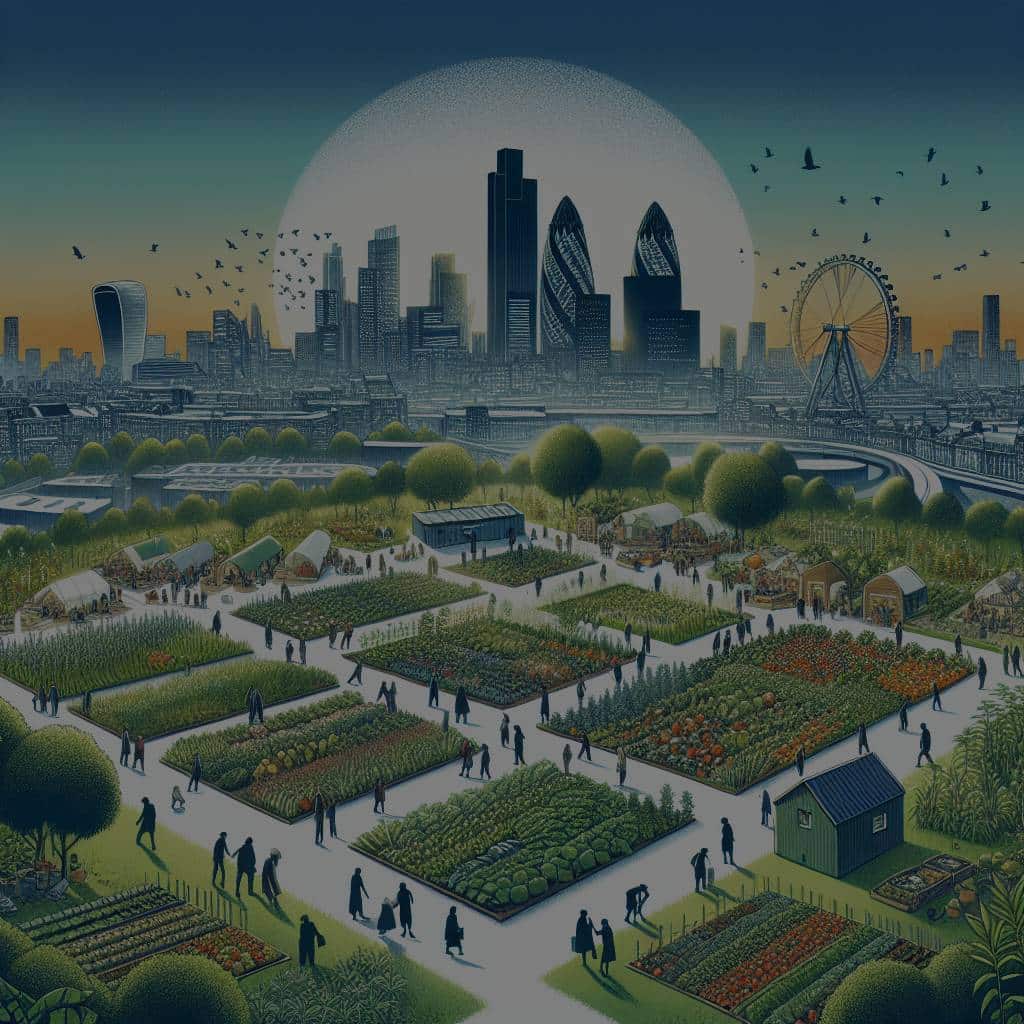Across the world, urban populations are growing exponentially. Simultaneously, we grapple with the dire effects of climate change, water scarcity, and food insecurity. In this unfolding scenario, an innovative solution is gaining momentum – Urban Agriculture. It’s the practice of cultivating, processing, and distributing food in or around cities. British urban centres are at the forefront of this movement, with community gardens, rooftop farms and university-led initiatives changing the landscape of food production and consumption. Here, we delve into this evolving story of urban farming in British cities and its significant role in advancing sustainability.
Urban Farms: A New Paradigm in City Landscapes
Urban farming is not a quaint hobby; it is a transformative movement reshaping our cities. Imagine walking down a city street and instead of a vacant lot, there’s a thriving vegetable garden. Imagine looking out of your apartment window to see a rooftop buzzing with beehives and an array of salad greens. This is no longer a fantasy, but a reality in British cities.
Also read : How Can Mental Health Apps Tailored to UK Users Promote Well-Being?
Growing food in cities offers numerous advantages. The most significant being access to fresh, local food. Urban farms can provide city dwellers with fruits, vegetables, and herbs that are fresher, tastier, and more nutrient-dense than their supermarket counterparts. Furthermore, urban agriculture fosters a sense of community and socialisation. Gardening initiatives can unite neighbours, promote intergenerational interaction, and even bolster local economy by creating jobs and business opportunities.
The Role of Universities in Urban Agriculture
Universities in British cities have been instrumental in furthering urban agriculture, serving as hubs for research, innovation, and practical application. Universities not only possess the necessary resources but also a pool of young, energetic minds willing to challenge traditional farming systems and experiment with new ideas.
Also to read : What Are the Best Practices for Cybersecurity in UK Small and Medium Enterprises?
For example, university-led projects often involve aquaponics systems where fish and plants are cultivated together. Fish waste provides an organic food source for the plants, and the plants naturally filter the water for the fish. This symbiotic relationship mimics natural ecosystems and conserves water – a critical consideration in urban areas where water access can be limited.
Community Engagement in Urban Farming Practices
Urban farms have the power to bring people together and foster a sense of community. They offer a platform for residents to engage with each other and their surroundings in a meaningful way. From children learning about where their food comes from, to adults acquiring new skills, the social benefits of urban farming are manifold.
Community gardens, in particular, are a common feature of urban agriculture in British cities. These communal spaces allow people to grow their own food, promote social interaction, and foster a sense of ownership and pride in their neighbourhoods. They can also be a source of therapeutic activity, providing an escape from the hustle and bustle of urban living.
Urban Farms and Climate Resilience
Urban agriculture can contribute significantly to cities’ resilience to climate change. Through practices such as rainwater harvesting, composting, and using renewable energy, urban farms can limit their environmental impact and even improve the local climate.
For instance, green roofs and vertical gardens can reduce the ‘heat island’ effect common in urban areas. By replacing concrete and asphalt with plants, cities can lower temperatures, improve air quality, and create habitats for urban wildlife. Furthermore, urban farms can help mitigate climate change by reducing the need for food transport, thus cutting down on greenhouse gas emissions.
Towards Sustainable Food Systems
As the global population continues to urbanise, food systems must adapt to meet the demands of city living. Urban farms can play a crucial role in this transition, offering a more sustainable, resilient, and socially inclusive alternative to conventional agriculture.
Urban farming promotes sustainability by reducing the distance food travels from farm to plate, thereby lowering carbon emissions. It also encourages biodiversity, improves soil health, and reduces food waste through composting initiatives. Moreover, urban farms can make better use of underutilised city spaces, turning them into productive, green areas that benefit everyone.
Urban agriculture is undoubtedly a powerful tool in the creation of sustainable food systems. It offers a novel approach to food production that is not only environmentally friendly, but also socially and economically beneficial. With its potential to address key challenges related to food security, climate change, and urbanisation, the urban farming movement is set to shape the future of our cities.
Urban Farms: Nurturing Food Justice and Security
As our urban populations continue to swell, issues of food justice and food security are coming to the forefront. These terms refer to the right of communities to have access to healthy, affordable food. In many urban areas, access to fresh food can be a challenge, especially for low-income communities. Here, urban farms are proving to be a viable solution.
Urban agriculture can help to bridge the gap between food production and consumption, providing the opportunity for city dwellers to have direct access to fresh, locally grown food. In fact, according to a number of studies available on Google Scholar, urban farms and community gardens have been found to increase food access and affordability in urban areas, particularly in low-income neighbourhoods.
In addition to providing affordable fresh produce, urban farms also create educational opportunities. They allow individuals to learn about food production and nutrition, enhancing their knowledge and skills in the process. This understanding of where food comes from and how it is grown promotes healthier eating habits and fosters a deeper respect for the environment.
Urban Farming: An Evolving Narrative in British Cities
Urban agriculture is not just a trend in British cities; it’s an evolving narrative that is changing the way we perceive food production and consumption. From community gardens springing up in vacant lots, to high-tech vertical farms in the heart of the city, urban farming has taken root across the UK.
One of the key reasons behind the success of urban farming in British cities is the support and collaboration among local communities, city councils, universities, and non-profit organisations. They are working together to educate residents about the benefits of urban farming, provide resources and tools, and create conducive policies and regulations.
The urban food movement in British cities is also being fuelled by a growing consumer preference for local, organic, and sustainable food. People are beginning to question the origin of their food and the impact of their food choices on the environment and their health. This shift in consumer behaviour is driving demand for urban farms and local food systems.
Conclusion: The Future of Food Systems
As British cities continue to grow and evolve, so too must our approach to food production. Urban farms are no longer just a novel idea; they are a viable and necessary part of the urban landscape. They are playing a crucial role in creating sustainable, resilient, and inclusive food systems.
The potential of urban agriculture goes beyond just food production. It can also be a catalyst for social and economic change. By providing opportunities for job creation, education, and community building, urban farms can help to tackle a range of social issues, including poverty, health disparities, and social isolation.
While the road to fully sustainable and equitable food systems is long, urban farming is undoubtedly a step in the right direction. It represents a powerful response to the challenges of climate change, urbanisation, and food insecurity. The urban farming movement in British cities is not just about growing food; it’s about growing communities, growing knowledge, and growing a more sustainable future.
The journey of urban farming in British cities continues to unfold, offering inspiring stories of community resilience, innovation, and sustainability. As we seek sustainable solutions for our urbanising world, the role of urban farms in shaping the future of food systems continues to grow in importance.






